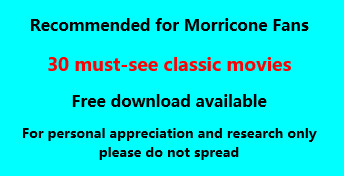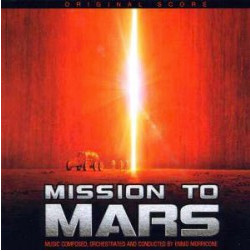Original Review by Jonathan Broxton
Mission To Mars has been one of the most critically despised movies of the year – a plotless, senseless would-be space epic that, according to the majority of the reviewers, took a great idea about the first, faltering steps of interplanetary travel and ruined it with bad acting, a terrible screenplay, and hopeless direction by the former wunderkind Brian De Palma. In fact, the only elements of the film to receive generally positive notice have been the special effects and Ennio Morricone’s elegiac score. And while I find myself disagreeing with the movie’s bad press, I couldn’t agree more with the appraisal of Ennio’s efforts. As film music, Mission To Mars is a blockbuster in every respect.
The film’s plot is a simple one: four astronauts are sent on a mission to become the first people to walk on the surface of the red planet. Led by Don Cheadle, the intrepid explorers set out into deepest space and, surprisingly, they reach Mars without a single glitch. While exploring a mountain range near the base camp, the crew are suddenly attacked by a huge tornado which appears out of the top of the highest peak, and communications with Earth are severed. A rescue mission is quickly arranged, and the four man crew (captain Tim Robbins, his wife Connie Nielsen, co-pilot Gary Sinise and engineer Jerry O’Connell) are dispatched to find out what happened and rescue any survivors. What transpires is not the heroic, gung-ho space adventure that many expected, but a lyrical, beautiful, thoughtful rumination on life, space, and the origins of humanity.
While undoubtedly an homage to Stanley Kubrick’s 2001, both visually and conceptually, Mission To Mars takes things one step further by providing answers to all the questions Kubrick asked back in 1968 – and this is the film’s only let-down. The film’s finale completely undermines what has transpired in the previous hour and a half, making what was once a thought-provoking “what if” scenario into a far too literal explanation of Mars’s secrets which leaves nothing to the imagination. The brilliance of films like 2001, and the recent Contact, is that the film leaves the viewer to make up their own mind as to the reality of what they have just seen. Mission To Mars compels the audience to accept everything they are presented with as truth, thereby shattering the film’s hard-earned realism. A degree of ambiguity would have helped retain the delicious mystery and romanticism of Mars, and would have made the film a far more satisfying experience.
But as a cinematic spectacle, Hollywood will need to go some to top the expansive vistas of Mars, the incredible beauty of space, and the almost balletic way life in orbit is depicted by De Palma’s camera. Aurally too, Mission to Mars is a complete triumph, with Ennio Morricone’s score leading the way. For the most part, Morricone eschews the traditional “spacey” sounds that clutter many of today’s science fiction films, instead composing from the heart. The romance of discovery, the beauty of space, the emotional connections that exist between the protagonists, the heroic sacrifices that are made for the good of others, the awe and wonder experienced when setting foot on a new planet. These are the things that Morricone’s music illustrates, and illustrates beautifully.
The first five cues on the album are introspective, quiet and peaceful in tone, lacking the orchestral pomp and bombast that one might usually associate with a journey into the far reaches of the galaxy. The opening track, ‘A Heart Beats In Space’, begins as nothing more than a series of ascending string scales accompanied by gentle electric guitar ambiences, an undulating flute line, a trumpet soloist, and a choir full of soothing female voices, before slowly moving into the first performance of the score’s main theme. ‘A Martian’ and ‘A World Which Searches’ all reprise the main thematic content, the former predominantly on a synthesiser, complemented by voices, and which swell intermittently to emotionally-heightened orchestral crescendos in a manner which is sometimes not too dissimilar to the warm-sounding space epics penned by John Williams.‘And Afterwards’ briefly dabbles in some angular, abstract shifting electronic tones that briefly resurrect memories of ‘The Conversation’ from Close Encounters, before returning into lyrical mode for the beautifully tragic ‘A Wife Lost’, with its Titanic-style synthesised voices.
The mood changes for good with the controversial church organ cue, ‘Towards The Unknown’, which is less successful on CD than it is in the film, but still manages to generate a great deal of unease in the listener. Stark organ tones, repeated in clusters, and an anxious electronic pulse increase in urgency and volume as the track progresses through the gradual inclusion of heavy bass drones and harsh, isolated string chords. The piece underscores a desperate scene in which the rescue crew vainly search for the tiny holes in the hull of their ship, damaged in a mini-meteorite storm, and which is draining the precious oxygen from the atmosphere. Although certainly an unconventional choice of orchestration, the organ does not sound as out of place as one might expect, and it at least shows that Morricone is willing to try new and unique ways of film scoring, no matter what the circumstances.
However, it is the final four cues which are the undoubted standouts of the album, beginning with the 13-minute ‘Sacrifice of Hero’, which accompanies the fateful spacewalk as the four rescuers are forced to abandon their craft high above Mars’s surface. What begins as an exercise in tension gradually develops into a terribly moving lament for the human spirit. A new arrangement of the main theme, which is actually not too dissimilar from the one he wrote for the Golden Globe-winning Legend of 1900, emerges, accompanied by a bold and bright horn countermelody and a heartbreaking movement for woodwinds and strings, while a bed of snare drums keep time underneath, continually drawing militaristic parallels with the romantic image of glorious death in battle. When the full might of the choir joins the fray during the rousing, patriotic ‘Where?’, you know you are hearing the work of a complete and utter genius. The score concludes with ‘All The Friends’, a pastoral coda with a Mission-esque oboe statement.
I cannot recommend this score highly enough. Fans of Morricone’s lyrical work will find themselves in raptures at the glorious nature of the Italian maestro’s themes, while admirers of his innovative and challenging scoring techniques will nod in appreciation of his bold choices of orchestration. Although the score is likely to be tarred with the same brush as the film, it would be unwise to simply lump the music in with all the other stodgy sci-fi scores that are written for stodgy sci-fi pictures. With a little more care, and with a better ending, Mission To Mars could have been a space odyssey for the generation, and despite the shortcomings of the film itself, Morricone’s music genuinely deserves a higer level of recognition.
Rating: *****
Track Listing:
- A Heart Beats In Space (7:58)
- A Martian (6:05)
- A World Which Searches (2:58)
- And Afterwards? (6:32)
- A Wife Lost (3:26)
- Towards The Unknown (8:14)
- Ecstasy of Mars (2:57)
- Sacrifice of a Hero (13:19)
- Where? (5:32)
- An Unexpected Surprise (2:32)
- All The Friends (2:38)
Running Time: 62 minutes 20 seconds
Hollywood Records 0108882HWR (2000)
Music composed and conducted by Ennio Morricone. Orchestrations by Ennio Morricone. Recorded and mixed by Dan Wallin. Edited by Suzana Peric. Album produced by Ennio Morricone.












